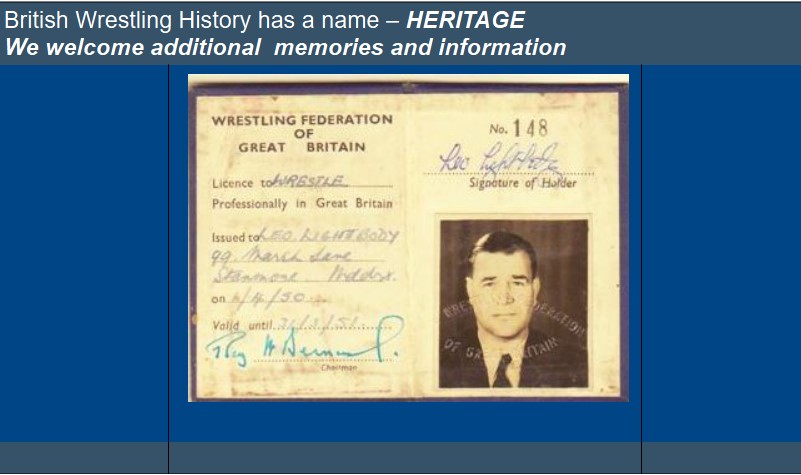Wrestling Heritage welcomes memories, further information and corrections.

Eccentric Dancing Ain’t No Wrestling
We searched for the term “Eccentric Dancing.” Apparently a form of unconventional dancing developed in 1920s America in which flips, contortions and acrobatics were used in an exuberant and expressive way.
Why? You may well ask.
Well, because the first time we came across the name Leo Lightbody was nothing to do with wrestling but his appearances giving exhibitions of exotic dancing.
Two years later he was cavorting in a very different way, Leo Lightbody was wrestling, and our earliest recorded bout was in May, 1932, when he lost to Harry Brooks in his home town of Huddersfield. The local newspaper said he was being trained by Douglas Clark. Leo had been born in the west Yorkshire town on 30th December, 1908. A pupil of King James’s School in Almondbury, the Old Almondburians would bestow their highest tribute of honorary life membership on him in 1980.
An all action combatant of the All-In rings no one was safe when Leo Lightbody was riled, including the referee should he have admonished the wrestler for something Leo considered unjustified. One journalist likened his style to a cross between the ferocity of Tiger DeLisle and the villainy of Jack Pye. Another report described Leo as debonair with handsome features crowned by hair that was so beautifully smooth he must have used Vaseline.
Having established himself in northern England Leo began to travel further afield in 1934 and could be seen in all parts of the country. Posters proclaimed him as “The Miracle Boy from Huddersfield,” but our efforts have failed to uncover the reason for this description.
He was fast, exciting but tenacious as well. Reports from Belle Vue, Manchester, tell of the time Leo’s opponent, Canadian wrestler Carl Van Wurden wrestled “for twenty eight minutes with his left hand useless as it was held in a vice like grip by Leo Lightbody.” On other occasions, when Leo was on the receiving end, it was noted that the beating seemed to bring out a more positive and aggressive response, like the time he tried strangling his opponent with a towel!
In February 1939 Leo sued the promoter William Bankier for breach of contract when he had inexplicably cancelled two wrestling engagements, at Liverpool and Belfast. The court heard that Lightbody was due to be paid £5 for each appearance. The judge at Westminster County Court found in Leo’s favour and he was awarded £15 for loss of fees, plus £1 damages.
By 1939 Leo was living in London and on the 1939 Register gave an address in Ealing and declared he was a fireman in the Auxillary Fire Service. During the war Leo served in the National Fire Service, which was created in August 1941 by the amalgamation of the Auxillary Fire Service and Britain’s local fire services.
Working in the fire service enabled Leo, albeit on a limited capacity, to continue wrestling during the Second World War. In February, 1943, Leo came very close to defeating the heavier and more powerful Scot, George Clark. Clark was a clear favourite before the match, but it was Leo who went on the offensive in the opening round, much faster than the Scot, and took the opening fall. Clark made an effort to get back into the match in the second round, but Leo’s nimbleness kept him out of trouble. Fans were stunned by the result when it occurred out of the blue. The powerful Clark lifted Leo above his head and tossed him into the air. Leo descended swiftly and heavily, crashing into the mat to be counted out.
A few months after the cessation of hostilities Leo was involved in one of wrestling’s great tragedies. The date was 20th April, 1946. He was wrestling Martin Schultz. A favoured manoeuvre of Schultz’s was to rebound from the ropes and fly into his opponent. The two had met many times and Leo was well aware of this move, but on that fateful night in April he dodged away, leaving Schultz to fly through the air and out of the ring. Schultz’s head struck the floor and his neck was broken. It was clear that something was wrong and Leo did not follow his usual practice of attacking his prostrate opponent. The wrestler died and the coroner recorded a verdict of death by misadventure.
Leo’s career continued through the 1940s, decreasingly so as a wrestler and more so as a referee, Master of Ceremonies and promoter, under the name British Wrestling Enterprises.
Page added 10/03/2024
